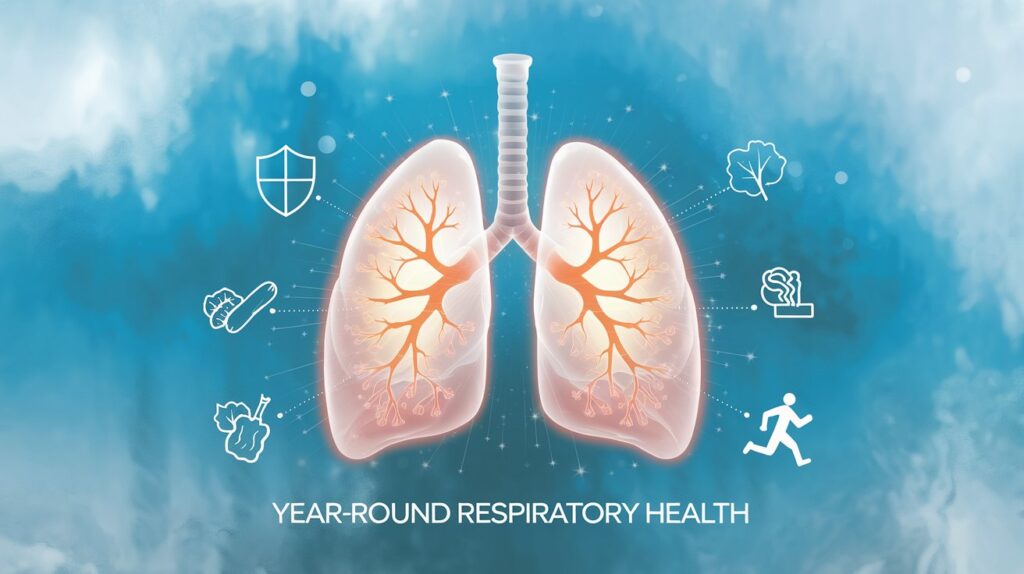
Respiratory illnesses are among the most common health challenges worldwide, affecting millions of people annually. From seasonal flu and colds to severe conditions like pneumonia and bronchitis, these diseases can significantly impact your health and quality of life. While certain factors like age and pre-existing conditions increase susceptibility, there are many proactive steps everyone can take to safeguard their lungs and reduce the risk of respiratory infections. This guide explores practical tips and strategies to maintain lung health all year long.
Understanding Respiratory Infections
Respiratory infections affect the airways and lungs, often caused by viruses, bacteria, or fungi. They range from mild conditions like the common cold to serious illnesses such as chronic obstructive pulmonary disease (COPD) or pneumonia. Common respiratory infections include:
- Common Cold: A viral infection of the upper respiratory tract.
- Influenza (Flu): A contagious viral disease affecting the respiratory system, often leading to severe complications.
- Pneumonia: A serious lung infection causing inflammation, with bacterial, viral, or fungal origins.
- Bronchitis: An infection causing irritation and inflammation of the bronchial tubes, usually triggered by viruses.
Although some infections are unavoidable, adopting preventive measures can help protect your lungs and overall health.
1. Practice Proper Hand Hygiene
One of the simplest yet most effective ways to prevent respiratory infections is by maintaining proper hand hygiene. Germs can spread through contaminated surfaces and then transfer to your face, especially the mouth, nose, or eyes.
- Wash your hands frequently with soap and water for at least 20 seconds.
- If soap and water are unavailable, use a hand sanitizer with at least 60% alcohol.
2. Strengthen Your Immune System
A robust immune system is your first line of defense against infections. Follow these tips to boost immunity:
- Eat a Balanced Diet: Include plenty of fruits, vegetables, whole grains, lean proteins, and healthy fats. Nutrients like Vitamin C, Vitamin D, and zinc play key roles in immune health.
- Exercise Regularly: Aim for at least 30 minutes of moderate physical activity most days to improve circulation and immunity.
- Get Adequate Sleep: Adults need 7–8 hours of sleep nightly to allow the body to repair and regenerate.
- Manage Stress: Chronic stress weakens the immune system. Practice relaxation techniques such as deep breathing, meditation, or yoga.
3. Stay Vaccinated
Vaccinations are vital for preventing respiratory infections caused by viruses. Key vaccines include:
- Influenza Vaccine: An annual flu shot protects against seasonal flu and its complications.
- Pneumococcal Vaccine: Protects against pneumonia caused by Streptococcus pneumoniae.
- COVID-19 Vaccine: Helps prevent respiratory illness caused by the SARS-CoV-2 virus.
Vaccines are especially critical for high-risk groups, such as older adults, children, pregnant women, and individuals with chronic health conditions.
4. Avoid Smoking and Reduce Exposure to Pollutants
Smoking is a leading cause of respiratory diseases, including chronic bronchitis, emphysema, and lung cancer. It damages lung tissues and weakens the immune system, increasing susceptibility to infections.
- Quit Smoking: This is the best step you can take for your lung health.
- Minimize Exposure to Pollutants: Stay indoors on days with poor air quality and use air purifiers at home. Avoid second-hand smoke and exposure to harmful chemicals.
5. Follow Good Respiratory Hygiene
Adopting good respiratory hygiene prevents the spread of germs and infections.
- Cover Your Mouth and Nose: Use a tissue or your elbow when coughing or sneezing to avoid spreading droplets.
- Avoid Close Contact: If you’re sick, maintain distance from others, especially those with weakened immune systems.
- Disinfect Frequently Touched Surfaces: Clean doorknobs, light switches, remote controls, and phones regularly to minimize germ spread.
6. Stay Hydrated and Humidify Your Environment
Proper hydration is essential for keeping your respiratory system healthy. Dry air can irritate mucous membranes, making infections more likely.
- Drink water throughout the day to stay hydrated.
- Use a humidifier, especially during winter, to maintain optimal indoor humidity levels.
7. Seek Medical Attention When Necessary
Early recognition of symptoms is crucial for timely treatment. Watch for persistent coughing, wheezing, difficulty breathing, chest pain, fever, or fatigue. If you experience any of these signs, consult a healthcare provider immediately. Early intervention can prevent complications and promote quicker recovery.
8. Schedule Regular Health Check-Ups
Routine check-ups help identify early signs of respiratory issues and ensure optimal lung health. For individuals with pre-existing conditions like asthma or COPD, regular visits to a healthcare provider are essential for monitoring and personalized care.
Conclusion
Respiratory infections can significantly impact your health, but with preventive measures, you can reduce your risk and protect your lungs. By practicing good hygiene, strengthening your immune system, staying vaccinated, avoiding harmful substances, and seeking timely medical attention, you can maintain respiratory health year-round.
At Vijay Super Specialty Hospital in Dharmapuri, we are dedicated to helping you achieve and maintain optimal health. Let us guide you in safeguarding your lungs so you can breathe easier every day.
